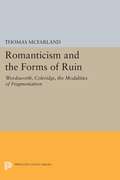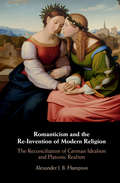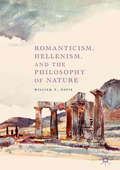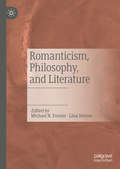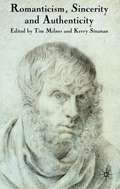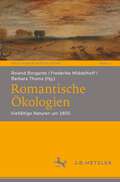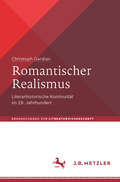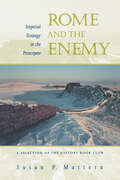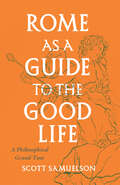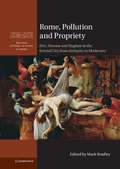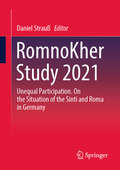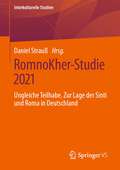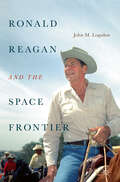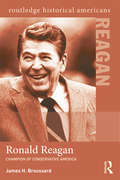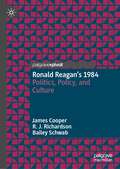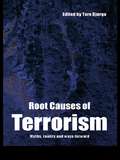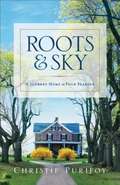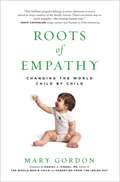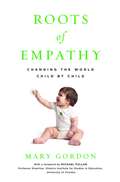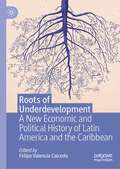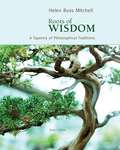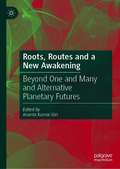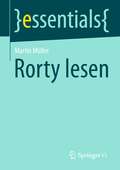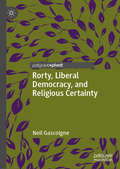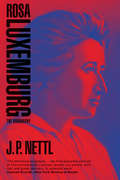- Table View
- List View
Romanticism and the Forms of Ruin: Wordsworth, Coleridge, and the Modalities of Fragmentation
by Thomas McfarlandDespite their hopeful aspirations to wholeness in life and spirit, Thomas McFarland contends, the Romantics were ruins amidst ruins," fragments of human existence in a disintegrating world. Focusing on Wordsworth and Coleridge, Professor McFarland shows how this was true not only for each of these Romantics in particular but also for Romanticism in general. Originally published in 1981.
Romanticism and the Re-Invention of Modern Religion: The Reconciliation of German Idealism and Platonic Realism
by Alexander J. HamptonEarly German Romanticism sought to respond to a comprehensive sense of spiritual crisis that characterised the late eighteenth century. The study demonstrates how the Romantics sought to bring together the new post-Kantian idealist philosophy with the inheritance of the realist Platonic-Christian tradition. With idealism they continued to champion the individual, while from Platonism they took the notion that all reality, including the self, participated in absolute being. This insight was expressed, not in the language of theology or philosophy, but through aesthetics, which recognised the potentiality of all creation, including artistic creation, to disclose the divine. In explicating the religious vision of Romanticism, this study offers a new historical appreciation of the movement, and furthermore demonstrates its importance for our understanding of religion today.
Romanticism, Hellenism, and the Philosophy of Nature
by William S. DavisThis book investigates intersections between the philosophy of nature and Hellenism in British and German Romanticism, focusing primarily on five central literary/philosophical figures: Friedrich Schelling, Friedrich Hölderlin, Johann Wolfgang von Goethe, Percy Shelley, and Lord Byron. Near the end of the eighteenth century, poets and thinkers reinvented Greece as a site of aesthetic and ontological wholeness, a move that corresponded with a refiguring of nature as a dynamically interconnected web in which each part is linked to the living whole. This vision of a vibrant materiality that allows us to become “one with all that lives,” along with a Romantic version of Hellenism that wished to reassemble the broken fragments of an imaginary Greece as both site and symbol of this all-unity, functioned as a two-pronged response to subjective anxiety that arose in the wake of Kant and Fichte. The result is a form of resistance to an idealism that appeared to leave little room for a world of beauty, love, and nature beyond the self.
Romanticism, Philosophy, and Literature
by Michael N. Forster Lina SteinerThis book offers a broad re-evaluation of the key ideas developed by the German Romantics concerning philosophy and literature. It focuses not only on their own work, but also on that of their fellow travelers (such as Hölderlin) and their contemporary opponents (such as Hegel), as well as on various reactions to and transpositions of their ideas in later authors, including Coleridge, Byron, Kierkegaard, Nietzsche, and Dostoevsky.
Romanticism, Sincerity and Authenticity
by Tim Milnes Kerry SinananThe categories of authenticity and sincerity, treated sceptically since the early twentieth century, remain indispensable for the study of Romantic literature and culture. This book, focusing on authors including Wordsworth, Macpherson and Austen, highlights their complexities, showing how they can become meaningful to current critical debates.
Romantische Ökologien: Vielfältige Naturen um 1800 (Neue Romantikforschung #4)
by Roland Borgards Frederike Middelhoff Barbara ThumsDer Band widmet sich der Frage, wie sich europäische Romantiken im Zeitraum zwischen ca. 1790 und 1850 mit ökologischen Theoremen und umweltbezogenen Problembereichen auseinandersetzen. Die Aufsätze dieses interdisziplinären Sammelbandes untersuchen dabei insbesondere den spezifischen Beitrag, den die Künste bei der Ausgestaltung und Formierung eines modernen ökologischen Denkens leisten, das seit Ende des 18. Jahrhunderts Gestalt annimmt, in den 1860er Jahren mit Ernst Haeckels Definition der ‚Ökologie‘ terminologisch grundiert wird und bis heute unser Verständnis von ökologischen Zusammenhängen prägt. Der Band bereichert auf diese Weise die bereits lebendige Forschungslandschaft der Environmental Humanities im Allgemeinen, des Romantic Ecocriticism im Speziellen und fragt mit Blick auf die ‚Romantischen Ökologien‘ nicht nur nach der Diversität und den konfliktreichen Bruchlinien ökologischer Denkformen um 1800, sondern auch nach dem Stellenwert, dem Eigen- und möglicherweise Mehrwert des Ästhetischen sowie, damit verknüpft, nach der Rolle des Romantischen für die Entstehung, Reflexion und Transformation eines ökologischen Denkens.
Romantischer Realismus: Literarhistorische Kontinuität im 19. Jahrhundert (Abhandlungen zur Literaturwissenschaft)
by Christoph GardianRomantik und Realismus werden in der Literaturgeschichtsschreibung vorwiegend als Gegensätze beschrieben. Ihre Rekonstruktion als dichotome Epochen verstellt aber den Blick auf die Kontinuitäten zwischen den beiden großen Literaturbewegungen des 19. Jahrhunderts, auf ihre gemeinsamen Problemfelder und Strategien zur Problembewältigung. Denn weshalb beziehen sich Texte in der zweiten Hälfte des 19. Jahrhunderts permanent auf eine Literatur, die sie als ›Romantik‹ kennzeichnen und aus der Welt schaffen wollen? Weshalb bearbeiten Texte, die als ›realistische‹ positioniert werden, über einen Zeitraum von immerhin gut 50 Jahren Konzepte und Themenkomplexe, die erkennbar ihren Anfang in der von ihnen abgelehnten und als obsolet konzipierten Romantik nehmen? Weshalb lassen sie fortwährend romantische Figuren auftreten oder romantische Motive handlungsleitend ein? Ganz offenbar handelt es sich beim Romantischen, das der Realismus bestreitet, um einen unerledigten Problemkomplex. Ausgehend vondiesen Beobachtungen stellt sich das Verhältnis von romantischer und realistischer Literatur weniger als epochale Dichotomie, sondern vielmehr als konstitutives Wechselverhältnis dar – als komplementäre Konstellation vor einem gemeinsamen Problemhorizont. Romantische und realistische Literatur lassen sich als alternative und gleichwohl parallele Strategien im Umgang mit historischen Transformationsprozessen auffassen, die ungeachtet ihrer markierten Konkurrenz kaum jemals ungemischt zur Anwendung kommen. Romantische und realistische Tendenzen treten in wechselseitiger Abhängigkeit auf. Dabei geht es sowohl den programmatisch romantisierenden als auch den programmatisch realistischen Texten um nicht weniger als die Gestaltung gesellschaftlicher Realität. Auf der Grundlage einer anderen Begründungsgeschichte der deutschsprachigen Literatur im 19. Jahrhundert lassen sich Beschreibungsmodelle für kulturelle Identifikations- und Transformationsprozesse gewinnen. Die untersuchten literarischen Texte formulieren ebenso Konzepte für den Umgang mit kulturellem Wandel wie sie Konstellationen kulturellen Wandels als Positionskämpfe zwischen romantischen und realistischen Akteuren konfigurieren.
Rome and the Enemy: Imperial Strategy in the Principate
by Susan P. MatternHow did the Romans build and maintain one of the most powerful and stable empires in the history of the world? This illuminating book draws on the literature, especially the historiography, composed by the members of the elite who conducted Roman foreign affairs. From this evidence, Susan P. Mattern reevaluates the roots, motivations, and goals of Roman imperial foreign policy especially as that policy related to warfare. In a major reinterpretation of the sources, Rome and the Enemy shows that concepts of national honor, fierce competition for status, and revenge drove Roman foreign policy, and though different from the highly rationalizing strategies often attributed to the Romans, dictated patterns of response that remained consistent over centuries.Mattern reconstructs the world view of the Roman decision-makers, the emperors, and the elite from which they drew their advisers. She discusses Roman conceptions of geography, strategy, economics, and the influence of traditional Roman values on the conduct of military campaigns. She shows that these leaders were more strongly influenced by a traditional, stereotyped perception of the enemy and a drive to avenge insults to their national honor than by concepts of defensible borders. In fact, the desire to enforce an image of Roman power was a major policy goal behind many of their most brutal and aggressive campaigns.Rome and the Enemy provides a fascinating look into the Roman mind in addition to a compelling reexamination of Roman conceptions of warfare and national honor. The resulting picture creates a new understanding of Rome's long mastery of the Mediterranean world.
Rome as a Guide to the Good Life: A Philosophical Grand Tour
by Scott SamuelsonA unique, portable guidebook that sketches Rome’s great philosophical tradition while also providing an engaging travel companion to the city. This is a guidebook to Rome for those interested in both la dolce vita and what the ancient Romans called the vita beata—the good life. Philosopher Scott Samuelson offers a thinker’s tour of the Eternal City, rooting ideas from this philosophical tradition within the geography of the city itself. As he introduces the city’s great works of art and its most famous sites—the Colosseum, the Forum, the Campo de’ Fiori—Samuelson also gets to the heart of the knotty ethical and emotional questions they pose. Practicing philosophy in place, Rome as a Guide to the Good Life tackles the profound questions that most tours of Rome only bracket. What does all this history tell us about who we are? In addition to being a thoughtful philosophical companion, Samuelson is also a memorable tour guide, taking us on plenty of detours and pausing to linger over an afternoon Negroni, sample four classic Roman pastas, or explore the city’s best hidden gems. With Samuelson’s help, we understand why Rome has inspired philosophers such as Lucretius and Seneca, poets and artists such as Horace and Caravaggio, filmmakers like Fellini, and adventurers like Rosa Bathurst. This eclectic guidebook to Roman philosophy is for intrepid wanderers and armchair travelers alike—anyone who wants not just a change of scenery, but a change of soul.
Rome, Pollution and Propriety
by Mark Bradley Kenneth StowRome, Pollution and Propriety brings together scholars from a range of disciplines in order to examine the historical continuity of dirt, disease and hygiene in one environment, and to explore the development and transformation of these ideas alongside major chapters in the city's history, such as early Roman urban development, Roman pagan religion, the medieval Church, the Renaissance, the Unification of Italy and the advent of Fascism. This volume sets out to identify the defining characteristics, functions and discourses of pollution in Rome in such realms as disease and medicine, death and burial, sexuality and virginity, prostitution, purity and absolution, personal hygiene and morality, criminality, bodies and cleansing, waste disposal, decay, ruins and urban renovation, as well as studying the means by which that pollution was policed and controlled.
RomnoKher Study 2021: Unequal Participation. On the Situation of the Sinti and Roma in Germany
by Daniel StraußBased on a cooperation between science and minority self-organizations, the book offers for the first time comprehensive data on the national minority of German Sinti and Roma and immigrant Roma in Germany. The social and educational situation of Sinti and Roma in Germany is examined using an innovative sampling strategy with interviewers from the minority. An international team of renowned authors from minority and majority analyzes the connections between discrimination, expectations and developments in school and training qualifications.
RomnoKher-Studie 2021: Ungleiche Teilhabe. Zur Lage der Sinti und Roma in Deutschland (Interkulturelle Studien)
by Daniel StraußDas Buch bietet auf der Basis einer Kooperation von Wissenschaft und Selbstorganisationen der Minderheit erstmals umfassend Daten über die nationale Minderheit der deutschen Sinti und Roma und zugewanderte Roma in Deutschland. Mit einer innovativen Sampling-Strategie mit Interviewer*innen aus der Minderheit wird die soziale und Bildungssituation von Sinti und Roma in Deutschland untersucht. Ein internationales Team renommierter Autor*innen aus Minderheit und Mehrheit analysiert die Zusammenhänge von Diskriminierung, Erwartungen und Entwicklungen bei Schul- und Ausbildungsabschlüssen.
Ronald Reagan and the Space Frontier (Palgrave Studies in the History of Science and Technology)
by John M. LogsdonWhen Ronald Reagan was elected in 1980, limits on NASA funding and the lack of direction under the Nixon and Carter administrations had left the U.S. space program at a crossroads. In contrast to his predecessors, Reagan saw outer space as humanity’s final frontier and as an opportunity for global leadership. His optimism and belief in American exceptionalism guided a decade of U.S. activities in space, including bringing the space shuttle into operation, dealing with the 1986 Challenger accident and its aftermath, committing to a permanently crewed space station, encouraging private sector space efforts, and fostering international space partnerships with both U.S. allies and with the Soviet Union. Drawing from a trove of declassified primary source materials and oral history interviews, John M. Logsdon provides the first comprehensive account of Reagan’s civilian and commercial space policies during his eight years in the White House. Even as a fiscal conservative who was hesitant to increase NASA’s budget, Reagan’s enthusiasm for the space program made him perhaps the most pro-space president in American history.
Ronald Reagan: Champion of Conservative America (Routledge Historical Americans)
by James H. BroussardFew politicians in recent American history are as well-known as Ronald Reagan, the 40th U.S. president. An iconic leader, Reagan shifted the direction of American politics toward a newly vigorous conservatism. Though he began his career as a New Deal liberal, by the end of the 1950s, Reagan had embraced conservative views. His presidency saw the longest peacetime prosperity in American history, as well as the fall of the Berlin Wall and the end of the Cold War, but also skyrocketing deficits and the Iran-Contra scandal. In the twenty-first century, Reagan’s legacy is both pervasive and contested, with supporters and detractors often divided along partisan lines. Yet Reagan’s own actions did not always fit into partisan boxes. In a clear-eyed and insightful narrative, James H. Broussard cuts through the mythology of both sides to produce a nuanced portrait of Reagan in his historical context. Supported by primary sources and a robust companion website, this concise biography is an ideal intoduction to this fascinating president and the issues that shaped America in the late 20th century. Routledge Historical Americans is a series of short, vibrant biographies that illuminate the lives of Americans who have had an impact on the world. Each book includes a short overview of the person’s life and puts that person into historical context through essential primary documents, written both by the subjects and about them. A series website supports the books, containing extra images and documents, links to further research, and where possible, multi-media sources on the subjects. Perfect for including in any course on American History, the books in the Routledge Historical Americans series show the impact everyday people can have on the course of history.
Ronald Reagan’s 1984: Politics, Policy, and Culture
by James Cooper R.J. Richardson Bailey SchwabForty years after Ronald Reagan’s successful re-election campaign, this book explores the significance of the year 1984 in the making of Reagan’s presidential record and the shaping of his legacy. The authors examine the broader context of how Reagan impacted the nature of the US presidency and international relations during the Cold War, and how this in turn interacted with American popular culture. Serving as an introduction to academics, students and the interested public into what is a rapidly increasingly Reagan scholarship, this book will also appeal to anyone interested in US elections, the evolving nature of the US presidency, and American culture more generally.
Root Causes of Terrorism: Myths, Reality and Ways Forward
by Tore BjørgoThis team of international experts analyses the possibilities and limitations of preventing or reducing terrorism by addressing the factors that give rise to it and sustain it. The key questions raised include:* what are the main circumstances that provide preconditions for the emergence of various types of terrorism?* what are the typical precipit
Roots and Sky: A Journey Home in Four Seasons
by Christie PurifoyWhen Christie Purifoy arrived at Maplehurst that September, she was heavily pregnant with both her fourth child and her dreams of creating a sanctuary that would be a fixed point in her busily spinning world. The sprawling Victorian farmhouse sitting atop a Pennsylvania hill held within its walls the possibility of a place where her family could grow, where friends could gather, and where Christie could finally grasp and hold the thing we all long for--home. In lyrical, contemplative prose, Christie slowly unveils the small trials and triumphs of that first year at Maplehurst--from summer's intense heat and autumn's glorious canopy through winter's still whispers and spring's gentle mercies. Through stories of planting and preserving, of opening the gates wide to neighbors, and of learning to speak the language of a place, Christie invites readers into the joy of small beginnings and the knowledge that the kingdom of God is with us here and now. Anyone who has felt the longing for home, who yearns to reconnect with the beauty of nature, and who values the special blessing of deep relationships with family and friends will love finding themselves in this story of earthly beauty and soaring hope.
Roots of Empathy: Changing The World Child By Child
by Mary GordonThe acclaimed program for fostering empathy and emotional literacy in children—with the goal of creating a more civil society, one child at a time Roots of Empathy—an evidence-based program developed in 1996 by longtime educator and social entrepreneur Mary Gordon—has already reached more than a million children in 14 countries, including Canada, the US, Japan, Australia, and the UK. Now, as The New York Times reports that “empathy lessons are spreading everywhere amid concerns over the pressure on students from high-stakes tests and a race to college that starts in kindergarten,” Mary Gordon explains the value of and how best to nurture empathy and social and emotional literacy in all children—and thereby reduce aggression, antisocial behavior, and bullying.
Roots of Empathy: Changing the World, Child by Child
by Mary Gordon Michael FullanRoots of Empathy — an evidence-based program developed in 1996 by longtime educator and social entrepreneur Mary Gordon — has already reached more than 270,000 children in Canada, the U.S., Japan, Australia, New Zealand, and elsewhere. Now, as The New York Times reports that "empathy lessons are spreading everywhere amid concerns over the pressure on students from high-stakes tests and a race to college that starts in kindergarten", Mary Gordon explains the value of and how best to nurture empathy and social and emotional literacy in all children — and thereby reduce aggression, antisocial behavior, and bullying.
Roots of Underdevelopment: A New Economic and Political History of Latin America and the Caribbean
by Felipe Valencia CaicedoThis book brings together world-renowned experts and rising scholars to provide a collection of chapters examining the long-term impact of historical events on modern-day economic and political developments in Latin America. It, uses a novel approach, stressing empirical contributions and state-of-the-art empirical methods for causal identification. Contributing authors apply these cutting-edge tools to their topics of expertise, giving readers a compendium of frontier research in the region. Important questions of colonialism, migration, elites, land tenure, corruption, and conflict are examined and discussed in an approachable style. The book features a conclusion from Alberto Diaz-Cayeros, Director of the Center for Latin American Studies at Stanford University. This book is critical reader for scholars and students of economic history, political science, political economy, development studies, and Latin American, and Caribbean studies.
Roots of Wisdom: A Tapestry of Philosophical Traditions (Sixth Edition)
by Helen Buss MitchellROOTS OF WISDOM, Sixth Edition, invites students to explore universal and current philosophical issues through a rich tapestry of perspectives including the ideas and traditions of men and women from the West, Asia, Peoples of the Americas, and Africa. No other book offers such breadth of multicultural coverage coupled with a clear, concise, and approachable writing style. Mitchell uses striking color and black and white images to illustrate our diverse cultural inheritance, using fine art, cartoons, poetry, movies, and popular music to bring the issues of philosophy to life for the student. This new edition features four new color inserts to illustrate philosophical themes as well as new material on animal intelligence, brain science, Asian approaches to war, and from President Obama's memoir on race and identity.
Roots, Routes and a New Awakening: Beyond One and Many and Alternative Planetary Futures
by Ananta Kumar GiriThis book seeks to find creative and transformative relationship among roots and routes and create a new dynamics of awakening so that we can overcome the problems of closed and xenopbhobic roots and rootless cosmopolitanism. The book draws upon multiple philosophical and spiritual traditions of the world such as Siva Tantra, Buddhist phenomenology and Peircean Semiotics and discusses the works of Ibn-Arabi, Thoreau, Tolstoy, Gandhi and Raimon Panikkar,among others.The book is transdiscipinary building on creative thinking from philosophy, anthropology, political studies and literature. It is a unique contribution for forging a new relationship between roots and routes in our contemporary fragile and complex world.
Rorty lesen (essentials)
by Martin MüllerDas essential bietet eine systematische Anleitung für eine fruchtbare Rorty-Lektüre. Zugleich stellt es eine kurze Einführung in die Grundzüge von Richard Rortys Neopragmatismus dar. Der Autor schlägt vor, ihn als fragile Balance von Pragmatismus und Romantik zu lesen, mit der Rorty unser Selbstbild ändern will. Außerdem erläutert er diesen transformativen Anspruch anhand einer Skizze von „Kontinenz, Ironie und Solidarität“ und der utopischen Figur der liberalen Ironikerin. Das essential schließt mit einem Hinweis auf Rortys bisher verkannte ethisch-politische Motivation und mit dem methodischen Vorschlag für das Weiterlesen seiner Texte: Man muss die pragmatistische Methode auf ihn selbst anwenden.
Rorty, Liberal Democracy, and Religious Certainty
by Neil GascoigneThis book asks whether there any limits to the sorts of religious considerations that can be raised in public debates, and if there are, by whom they are to be identified. Its starting point is the work of Richard Rorty, whose pragmatic pluralism leads him to argue for a politically motivated anticlericalism rather than an epistemologically driven atheism. Rather than defend Rorty’s position directly, Gascoigne argues for an epistemological stance he calls ‘Pragmatist Fideism’. The starting point for this exercise in what Rorty calls ‘Cultural Politics’ is an acknowledgement that one must appeal to both secularists and those with religious commitments. In recent years ‘reformed’ epistemologists have aimed to establish a parity of epistemic esteem between religious and perceptual beliefs by exploiting an analogy in respect of their mutual vulnerability to sceptical challenges. Through an examination of this analogy, and in light of Wittgenstein’s On Certainty, this book argues that understood correctly the ‘parity’ argument in fact lends epistemological support to the argument that religious considerations should not be raised in public debate. The political price paid—paying the price of politics—is worth it: the religious thinker is provided with a good reason for maintaining that their practices and beliefs are not undermined by other forms of religious life.
Rosa Luxemburg
by J.P. NettlA classic book on the legacy of Rosa Luxemburg's work with essays of political analysis by leading scholarsAs an advocate of social democracy and individual responsibility, Rosa Luxemburg (1871-1919) remains the most eminent representative of the revolutionary socialist tradition. She was a radical activist who was willing to go to prison for her beliefs, including her protest of the First World War. This volume provides a representative sampling of Luxemburg's essential writings, many of which have been rarely anthologized. Her examination of capitalist "globalization" in her era, the destructive dynamics of nationalism, and other topics are joined with hard-hitting political analyses, discussions of labor movement strategy, intimate prison letters, and passionate revolutionary appeals. Among the selections are "Rebuilding the International," "What Are the Leaders Doing?" and excerpts from "The Accumulation of Capital--An Anti-Critique."Luxemburg's powerful impact on the twentieth century is documented in the accompanying essays, which draw readers into the "discussions" that leading intellectuals and activists have had with this vibrant thinker. Included are essays by Luise Kautsky, Lelio Basso, Raya Dunayevskaya, Paul Le Blanc, Andrew Nye, and Claire Cohen. These writers engage Luxemburg's life and work in ways that enrich our understanding of her ideas and advance our thinking on issues that concerned her. This volume will benefit readers with its rich and continuing collective evaluation of this passionate revolutionary's life and thought.
